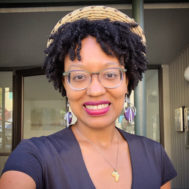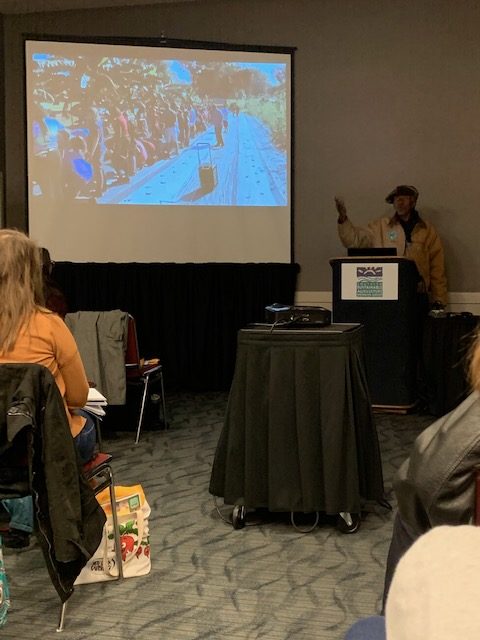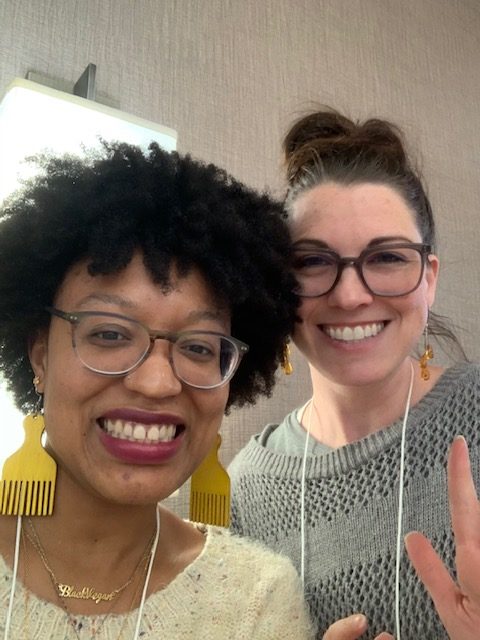 February 2o, 2020
February 2o, 2020
By Frances Roberts-Gregory
Frances Roberts-Gregory is a PhD candidate in Society & Environment.
With travel support from the Berkeley Food Institute (BFI), I travelled last month to the Southern Sustainable Agriculture Working Group (SAWG) Conference in Little Rock, Arkansas. As a Black environmentalist living and working in New Orleans, and Berkeley PhD student, I wanted to learn more about the state of organic agriculture in the Southeast. Among other reasons, many women I have interviewed for my dissertation are concerned about the impact of climate change on sustainable food systems.
I moreover hoped to attend SAWG to develop deeper relationships with Black farmers I used to know with the Southeastern African Americans Farmers Organic Network (SAAFON) and the Truly Living Well Center for Natural Urban Agriculture. I also desired to learn more about regenerative agriculture as a descendant of Black sharecroppers and field hands in North Carolina and Georgia who are negatively impacted by industrial chicken and hog farming (cough, cough Smithfield). For these reasons and more, SAWG promised to be a truly educational and transformative experience.
What I Saw

Sam X presenting on engaging youth in farming by partnering with 4-H and Fort Valley State University. Photo by Frances Roberts-Gregory.
SAWG actually exceeded my expectations. Not only was I able to visit a new southern city and taste vegan entrees at the Black owned MeMe’s Twisted Potato, I was able to attend a poster session, seed swap, and trade show. I saw solar panels on high tunnels and I reconnected with Black farmers like Rashid Nuri from Truly Living Well. I saw farmers debate the merits of hemp farming in the South and sign the Farmer’s Statement on Climate Change. I also saw Black and people of color (POC) farmers build relationships with one another and discuss the need to bridge art and agriculture through community villages. I saw Black students from Tuskegee, Fort Valley and Florida Agricultural and Mechanical University (FAMU), all Historically Black Universities, present innovative research and commit themselves to sustainable agriculture. I finally witnessed firsthand, the tensions involved in creating safe spaces for Black and POC farmers after white allies, amidst controversy, were encouraged to leave an information exchange for POC farmers in sustainable agriculture.
What I Learned
Since the Southeast is home to many billion dollar disasters, I learned why federal disaster relief should assist sustainable farmers. At the Organic Agriculture Research Forum co-sponsored by the Organic Farming Research Foundation and Tuskegee University, I learned how soil health, agro-ecosystem diversity, rotational grazing, and regional food hubs increase growers’ resilience. I also learned about solutions for land access for beginning farmers of color and the unique challenges associated with pest management in the sunnier and wetter South. I learned how to access USDA loans and NRCS grants for disadvantaged and veteran farmers. I lastly learned how farmers of color are engaging storytelling for change, integrating conservation and wildlife management on family farms, and collaborating with one another to create farm plans and obtain farm numbers. Black farmers overwhelmingly advocated for growing new varieties of fruits and vegetables for specific ethnic communities and cultivating more public-private partnerships with academic institutions like Historically Black Colleges and Universities (HBCUs).

Frances and BFI alum Amber Sciligo from the Organic Center.
How it Changed my Thinking
I was really impacted by a presentation on citrus greening disease from BFI alum Amber Sciligo who currently works for the Organic Center. She discussed how important it is to control the Asian citrus psyllid if we want affordable lemons in the future. After attending SAWG, I also have a better understanding of the tensions between Black farmers and the USDA/NRCS. Prior to this trip, it never occured to me that some Black farmers, scarred by a history of USDA discrimination, preferred to remain self-sufficient and reject governmental assistance. This trip also taught me how agriculture can be a solution for climate change when farmers and ranchers improve soil health and increase soil organic matter through cover crops, crop rotation, grazing management, water management, and reduced tillage. I also learned about protecting land from urban development, renewable energy production on farms, and the need for increased technical assistance, research, and financial incentives for disadvantaged farmers and ranchers. Most importantly, artist-farmer Sam X reminded me that if you want young people to work on farms, you have to bring in artists and stop telling sad stories. I’m thus excited for the next SAWG conference and hope to conduct future research that will benefit southern growers!
Frances Roberts-Gregory is an ecowomanist, Black geographer, and PhD Candidate in Society & Environment at UC Berkeley. She teaches courses on gender and climate justice in New Orleans and is a founding member of the Feminist Agenda for a Green New Deal. Frances also engaged youth around stormwater management, flooding, and sea level rise for the Deep South Center for Environmental Justice. She recently attended COP25 in Madrid with the Women’s Environment & Development Organization. Next year, Frances will start a new position as an Assistant Professor of Anthropology and co-director of the Spelman College Food Studies Program. She can be reached via twitter or facebook at @BlackngreenPhD.